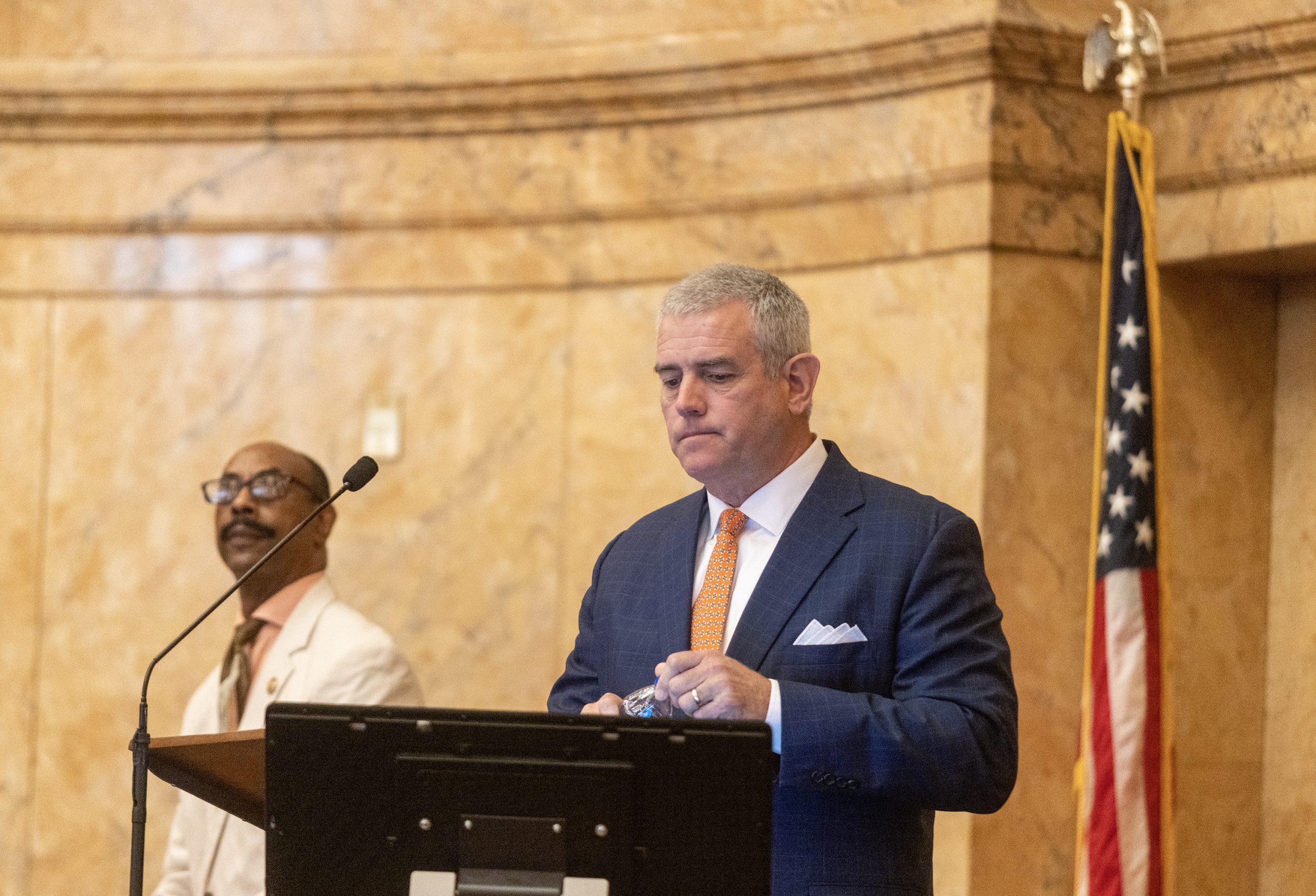Mississippi Today
One last effort to explain MAEP to Speaker Gunn

One last effort to explain MAEP to Speaker Gunn
Responding to questions from members of the media recently about funding the Mississippi Adequate Education Program, House Speaker Philip Gunn, R-Clinton, asked for a show of hands of those who understood the school funding formula.
“Nobody really understands it. (School) superintendents don't understand it,” Gunn said, making it clear his question was rhetorical. “We had a plan five or six years ago that was incredibly understandable.”
Gunn was referring to the plan put forward by him and then-Lt. Gov. Tate Reeves. That plan was rejected by the Senate despite both Gunn and Reeves putting on a full-court press to pass it.
The fact of the matter is that there are many similarities between his failed plan and the MAEP.
Both are vehicles to provide the state's share of funding to meet the needs of local school districts — needs like teacher salaries, utilities, custodial help, textbooks and other basic needs.
And both meet those needs by providing some amount of money on a per pupil basis.
The key difference is that the per pupil spending, known as the base student cost, was determined in the Gunn plan by the Legislature. Legislators could make that base student cost whatever they wanted it to be. The Legislature could lower or increase the base student cost each year based on their whim.
The ability of the Legislature to establish the base student cost is what makes the Gunn/Reeves plan so simple. Besides that simplicity, it also might appeal to Gunn and others because there is no way to underfund a formula that is not based on any objective criteria, but simply based on the thinking of legislators.
If there is no way to objectively determine what full funding is because full funding is whatever legislators say it is, then there is no way for the public to hold politicians accountable for not fully funding education.
Gunn was the primary reason full funding of MAEP was blocked during the recently completed 2023 session. He refused to put additional funds in a formula he referred to as a “black hole” and as confusing.
The 2023 session will be Gunn's last regular session as he is not running for reelection. Taking him at his word that he does not understand MAEP after five terms in the House (three as speaker) and after serving as a local school board chair, here is one last effort to explain the formula to him.
First of all, based on the MAEP law, the state Department of Education determines the instructional, administrative, maintenance and ancillary costs for level 3 or adequate schools.
The MAEP base student cost is then ascertained by averaging the cost in each of those four areas — instructional, administrative, maintenance and ancillary — of educating a child in those adequate districts. But it is important to note those adequately performing districts that spend significantly more or less than other school systems are not used in developing the base student cost.
And in developing the all-important base student cost, the formula is weighted in favor of using school districts that spend less than in using school districts that spend more.
The formula also calls for every district to provide a portion of the MAEP base student cost. Districts are supposed to provide in local funds whichever is less of 28 mills (a mill is a taxing unit for property) or 27% of the base student cost. The state is supposed to provide the rest of the cost.
For whatever it is worth, nearly all school districts levy more than 28 mills.
The formula is calculated every four years. In the years between those recalculations, the formula is supposed to be adjusted based on a modest inflation factor.
When the Legislature enacted MAEP in 1997, the goal was to ensure that all districts have a base level of funding that theoretically would be enough to provide an adequate education. And here is perhaps the most important aspect of the formula: the state provides more funds for property poor districts than it does for affluent districts. But in helping those property poor districts, there was a commitment made in 1997 that those wealthier districts would not receive less funding under the new formula than under the old formula.
There is an argument that now, about 25 years after the formula was created, that the wealthier districts should be paying more of their own funds for the basic operation of their schools and thus freeing up more state funds for poor districts. The Senate wanted to have that debate in the 2023 session and then fully fund MAEP for the first time since 2007-2008.
Gunn prevented that debate from happening in the House. Apparently, he said, he did not understand the formula.
This article first appeared on Mississippi Today and is republished here under a Creative Commons license.
Did you miss our previous article…
https://www.biloxinewsevents.com/on-this-day-in-1947/
Mississippi Today
MDOC promotes inmate boxing program, but lawmakers say money could be better spent
Boxing in sanctioned matches in a ring donated by rapper Jay-Z. Throwing and catching a football in the yard. Facing off in table tennis matches.
Sports teams have come to Missisisppi's prison system, giving incarcerated people a creative way to stay active, change attitudes, build sportsmanship and help in their rehabilitation, corrections officials said.
“We encourage our inmates to be involved in sports activities as it battles idleness in prison. We have created many different teams to allow them to get out of their dorms and participate in being active”, Commissioner Burl Cain said in a Wednesday news release.
Research has found that prison sports programs have social, mental and physical benefits, and participation in sports can help lessen detrimental health impacts people experience through incarceration.
But the bipartisan chairs of the Legislature's corrections committees are questioning why incarcerated people have been allowed to participate in boxing, which they say could create a violent environment and put the state on the hook for the boxers' medical care if they are injured.
House Corrections Chair Rep. Becky Currie, R-Brookhaven, and Senate Corrections Chair Juan Barnett, D-Heidelberg, said there are better uses of MDOC's budget than a sport as harmful as boxing.
They would rather see the department focus on a number of other efforts, including drug and alcohol treatment, job training and housing placements to prepare people to leave prison and not return.
“We have to make sure we're not teaching them to box,” said Currie, who is serving her first session as chair of the committee. “… This is not where we need to spend our time and our money.”
Barnett said incarcerated people should have access to recreation and time out in the yard, and he sees how supporters can see rehabilitative value in boxing and other sports teams. But those are less of a priority compared to MDOC's main role: to correct people, he said.
Boxing programs exist around the country in state and federal prisons, including in Louisiana.
The Angola State Penitentiary, where Cain served as warden, has a team. Henry Montgomery, who founded the program as an inmate, helped form the boxing teams there. Montgomery was released from prison in 2021 at the age of 75. His case led to the U.S. Supreme Court decision that all states were required to retroactively apply the ban on mandatory death-in-prison sentences for juveniles that it announced in its earlier Miller v. Alabama ruling.
In the news release, MDOC said the boxing team members are required to take drug tests and have a pre-match physical.
During the matches, medical staff and ringside trainers are present along with referees, timekeepers and official judges. Mississippi Athletic Commission Chairman Randy Phillips has helped with boxing training and is ensuring that MDOC's safety equipment meets standards, according to the news release.
Parchman's first boxing match was in November against incarcerated boxers who traveled to the Mississippi State Penitentiary at Parchman from the Central Mississippi Correctional Facility, according to MDOC. Creation of a boxing program at CMCF has been cited as a reason why the women were relocated from the 1A-Yard to unit 720 in 2022.
A pamphlet shared with Mississippi Today showcases a March 28 “Fight for the Title” event hosted at Parchman. Listed were the 22 members of the boxing team, 14 of whom fought in matches that day.
Tangya Allen-Elliott attended both boxing events to support her nephew, Carlos Allen, who coaches the boxing team. She said the March event had a good atmosphere and the matches seemed professional and safe.
Allen, 35, was appointed as the boxing team coach because of his leadership, Allen-Elliott said. Prior to incarceration, he played sports, refereed and coached.
He has been in the state prison system for three years and at Parchman for over a year, his aunt said. Allen was sentenced to over 100 years for drug trafficking, sale of fentanyl and possession of other drugs. Additionally, he was sentenced as a habitual offender, meaning he is not eligible for parole.
Being part of the boxing team has helped her nephew have a positive impact on others and mentor younger men – all of which give him hope in prison.
She said the sport is a great opportunity for the men, and she hopes it can serve as a guide for other states, such as Alabama, where she lives.
“They're on the right track,” Allen-Elliot said about boxing in Mississippi prisons.
“I had never seen a prison do something to this impact.”
This article first appeared on Mississippi Today and is republished here under a Creative Commons license.
Mississippi Today
Medicaid expansion debate stirs memories of family medical debt for Mississippi senator
As clergy, physicians and business leaders have for weeks rallied at the state Capitol to expand Medicaid coverage to the working poor, observers can often spot the same conservative lawmaker listening attentively on the sidelines.
Sen. Chad McMahan, a Republican from Guntown, hasn't attended the events as a participant, a supporter or an opponent of the rallies. Rather, he goes because he wants to listen to the debate or because his constituents are there.
In fact, McMahan has been a quiet, yet constant supporter of Medicaid expansion, or Medicaid reform as he calls it. He believes the policy can give rural hospitals like North Mississippi Medical Center in his hometown of Tupelo a major boost and create a healthier population.
The three-term lawmaker is widely known for telling reporters that his main duty at the Capitol is to vote how the majority of the people in his district want him to vote. But he also openly shares his childhood story that he believes gives him a unique perspective on how steep medical debt can crush hard-working Mississippians.
When McMahan was in the ninth grade, he suffered an injury and had to be treated at the local emergency room. When the $20,000 bill came due for the medical services, though, there was a major snag: McMahan's family had no health insurance.
“That doesn't sound like a lot of money today, but in 1986, $20,000 would buy two top-of-the-line Chevrolet pickups,” McMahan said. “Today, it won't even buy a piece of a Chevrolet pickup truck.”
The legislator's father owned a cabinet-making business in north Mississippi, and his mother did clerical work. But the medical debt forced them to make tough decisions that thousands of Mississippians still face today.
It was impossible for the McMahan family to pay the bill in one swoop. Instead, they set up a payment plan with the hospital to pay the bill off over several years.
“It put a lot of stress and anxiety on my family,” McMahan recalled. “I saw my mom and dad having to decide at the dinner table whether they were going to pay a mortgage, buy groceries or pay the hospital bill that month.”
READ MORE: Medicaid expansion negotiators still far apart after first public meeting
Roughly 74,000 Mississippians don't make enough money to afford insurance, yet make too much money to qualify for Medicaid and find themselves in positions similar to the one the McMahan family was in decades ago.
But the state Legislature has a chance this year to address this issue because for the first time since the federal Affordable Care Act became law, it's considering expanding Medicaid to the working poor as the ACA envisioned.
The House and Senate this week are locked in negotiations on a final expansion bill after the two chambers passed vastly different proposals.
The House's initial plan aimed to expand health care coverage to upwards of 200,000 Mississippians, and accept $1 billion a year in federal money to cover it, as most other states have done.
The Senate, on the other hand, wanted a more restrictive program, to expand Medicaid to cover around 40,000 people, turn down the federal money, and require proof that recipients are working at least 30 hours a week.
The negotiators met publicly for the first time on Tuesday, but the six lawmakers remained far apart from a final deal. The Senate simply asked the House to agree to its initial plan. But the House offered a compromise “hybrid” model that uses public and private options to implement expansion.
McMahan said he personally supports the House's effort to expand to the full 138% of the federal poverty level, or an individual who makes $20,782 annually. But he also supports the Senate's effort to have an ironclad work requirement for the recipients.
While McMahan has compassion for uninsured people he doesn't think fiscally conservative Republicans should agree to expansion legislation that leaves out a work requirement or sets up a process for people to remain on the system indefinitely.
“I'm proud that I live in a country where there is a safety net to catch people and help people, but I'm not for turning the safety net into a hammock,” McMahan said.
The Senate negotiators were noncommittal on the hybrid compromise. House Medicaid Chairwoman Missy McGee scheduled a second conference committee meeting for Thursday afternoon.
McMahan applauded the House and Senate leaders for trying to come to a resolution on expansion, especially after the policy has been a nonstarter for the last 10 years at the Capitol.
He doesn't think it's his job to convince his Senate colleagues to change their minds. But he does want people who remain unabashedly opposed to the policy to listen to the stories of people across the state who still can't afford basic health care.
“I see the people who are out there,” McMahan said. “A lot of construction workers, a lot of fast food employees. I see the people who are working every day getting up and going to work who have never taken a hand out in life for anything who are not covered by health insurance.”
This article first appeared on Mississippi Today and is republished here under a Creative Commons license.
Mississippi Today
At Lake High School in Scott County, the Un-Team will never be forgotten
They were the 1974 Lake High Hornets football team, 29 players strong. But in Scott County, right there just off Highway 80, they are forever known, for good reason, as The Un-Team.

That's “un” as in: undefeated, untied, un-scored upon, and virtually un-challenged. The Hornets, coached by Granville Freeman, a maniacally demanding 26-year-old in only his second year as a head coach, out-scored opponents 312 to zero over 10 games. No opponent came within three touchdowns of Lake. This was before Mississippi had statewide high school football playoffs, but Lake was the undisputed champion of the old Cherokee Conference. The Hornets won the south division and were supposed to play French Camp for the league championship. Apparently, French Camp decided that discretion really is the better part of valor and declined to play.
Fifty years later, looking at the scores, it is difficult to blame them.
The 1974 Lake High School Un-Team
Undefeated, un-tied, un-scored upon
Lake 18 | Choctaw Central 0
Lake 20 | West Lauderdale 0
Lake 40 | Stringer 0
Lake 30 | Beulah Hubbard 0
Lake 54 | Sebastopol 0
Lake 42 | Hickory 0
Lake 20 | Scott Central 0
Lake 30 | Nanih Waiya 0
Lake 20 | Clarkdale 0
Lake 38 | Edinburg 0
Lake 1 | French Camp 0 (forfeit)
Twenty-six of the 29 Lake Hornets are still living, and all 26 will be back in Scott County this Saturday night to be honored by the Scott County Sports Hall of Fame at Roosevelt State Park. They will come from nine different states and one will return home from Germany. They wouldn't miss it. Would you?
Said Freeman Horton, the team's best player, who later was a four-year starter at Southern Miss, a longtime coach, and now lives in Horn Lake, “We achieved something back then that can never be surpassed. Some other team, somewhere, might tie our record, but I doubt it. One thing's for sure, they can't beat it. There's no way.”
Coach Granville Freeman was an old school coach in some ways but decades ahead of most high school coaches in so many others, as we shall see. “When I went to Lake in 1973, I told them we would have a team that when opponents got ready to play us, they would be shaking in their shoes,” Freeman said. “I'd say we accomplished that in 1974.”
Old school? Lake ran out of a straight T-formation, nothing fancy. The Hornets played a standard four-man front defensively. Freeman demanded all-out effort, all the time. He drove the team bus to practice 5.3 miles away from the school. After what was usually a long, tortuous practice if he wasn't satisfied with the effort or performance, he followed in the bus, lights on, while the players ran all the way back to the high school. If they were going too slow, he'd rev the engine. If that didn't work, he might even bump a straggler's rear end.
“You couldn't do that these days, could you?” Freeman said, chuckling. “I'd need a really good lawyer.”
He would also have needed a jury made up of avid Lake football fans who knew there was method to his madness.
There's no doubt Freeman worked at least as hard as his players. Said Harry Vance, the team's quarterback, “Coach was 25 years ahead of everybody else in the way he used film and developed scouting reports. By the time we met as a team after church on Sunday, he had graded Friday night's film and had a 20-page scouting report prepared and printed on the next opponent. It was only Sunday and we already knew everything we were going to do.”

Said Vance of his coach, “He coached 24 hours a day, seven days a week. And he was crazy smart.”
Horton, who starred as an outside linebacker on defense and left tackle on offense, was widely recruited. Mississippi State, Ole Miss and Southern Miss all offered scholarships. So did Bear Bryant at Alabama, and this will tell you much about Granville Freeman's crazy intellect. Bryant and Ken Donahue, his top recruiter, visited Lake to recruit Horton. Freeman was discussing Horton with Bryant and Donahue after practice when Donahue asked, “Coach, I don't understand why you don't you play your best athlete at middle linebacker? At Alabama, Horton would be playing in the middle.”
Responded Freeman, “Well, Coach, I'll tell you why. If I line up Horton in the middle, I don't have any idea which way the other team is gonna run. But if I line him up one side, I know for damn sure which way they ain't about to run. This way, we only have to defend half the field.”
Freeman says he looked over at Bryant. The legendary, old coach was chuckling, as he told Donahue: “Well, now you know, Coach, makes a whole lot of sense to me.”
Many in Lake thought Freeman really had lost his mind during the spring of 1974. That's when he called his players together and told them summer workouts would be different that year. Twice a week, a ballet teacher was going to come from Jackson and work them out in the gymnasium. Yes, they were going to take ballet lessons, and they would each pay for the lessons. “We thought Coach Freeman was nuts when he told us about it,” said Dewey Holmes, the team's star running back who rushed for more than 1,200 yards. “But we all did it.” These weren't rich kids, mind you. Many of the Lake players picked up aluminum cans on roadsides to earn the money to take ballet.
It made all kinds of good sense to Freeman. “Ballet is all about balance, about footwork, about flexibility and core strength,” Freeman said. “I thought it was perfect training for a football player. We called ourselves the twinkletoes Hornets.”
A lot of folks laughed when they heard about it. They weren't laughing a few months later, not after 312-0.
And nobody was laughing in the locker room at halftime of a game at Hickory. Lake led only 7-0 and Freeman was furious. So, he yanked the helmet off one player and threw it through a window. “I surprised myself with that,” Freeman said. “I thought, ‘Now, I've done it.'”

So he did it some more. He grabbed more helmets, threw them through more windows. Final score: Lake 42, Hickory 0. Of course, Hickory wanted those windows fixed and when the bill arrived, Lake Hornets fans raised the money to pay.
Another time, after a scoreless first half with Stringer, Lake players feared what would happen in the locker room. They expected another tirade. Instead, Freeman walked in and told them he was so disgusted he was quitting on the spot. So, he walked out of the locker room and took a seat in the stands. And that's where he was when the Hornets returned to the field and proceeded to score 40 straight points.
Many readers might wonder what happened to Granville Freeman, so wildly successful, so early in his coaching career. Answer: Four years later, he retired from coaching at age 30 with a 57-2-1 record.
Why? Burnout was surely one reason, and there were at least 485 more. His last monthly paycheck at Lake was for $485. Said Freeman, I did the math and figured out what I was making per hour. I was coaching the junior high and high school teams, mowing and lining the fields, watching film, carrying it to Jackson to be developed, doing scouting reports, washing uniforms, running the summer program, teaching, driving the bus. It came out to 17 cents an hour. I wasn't sleeping much.”
As many coaches in Mississippi have, Freeman stopped coaching and started selling insurance. Fourteen years ago, when he explained the reasons for his his early retirement from coaching, the interview was interrupted when someone knocked and slipped a payment under the door of his State Farm office. Freeman never missed a beat, laughing and telling this writer, “You know, that right there never happened back when I was coaching.”
Now 77, he has retired also from State Farm. The insurance money was far better in those later years but nothing ever happened to come close to the satisfaction of that unparalleled autumn half a century ago.

Undefeated. Un-tied. Un-scored upon. Perfect. That's why all 26 living players are coming back. That's why end Dexter Brown is traveling from Frankfurt, Germany, to take part. That's why Holmes, the star running back who later rose to the rank of full-bird colonel and traveled the world in the U.S. Air Force, is coming from his home in Tucson, Ariz.
“We grew up together, we achieved together,” Holmes said. “I wouldn't miss this.”
So many stories will be told, none more than what follows.
Nobody had come really close to scoring on the Lake Hornets until the final game, when a fourth quarter fumbled punt gave Edinburg the ball at the Lake 8-yard line. Three plays later, the ball was still on the 8, and Edinburg, trailing 38-0, lined up for a field goal. Moochie Weidman, the Hornets' nose guard who might have weighed 140 pounds, broke through the center of the line so quickly he blocked the kick with his chest.
How did it feel, someone asked Moochie, after he regained his breath. He answered with a grin. “It hurt so good,” he said.
Freeman Horton says it remains probably his favorite memory of that un-season. “Moochie was our smallest guy, the one you'd least expect, and he was the hero,” Horton said.
Sadly, Moochie Weidman is one of the three deceased 1974 Lake Hornets, but he will be remembered, ever so fondly, Saturday night.
This article first appeared on Mississippi Today and is republished here under a Creative Commons license.
-
228Sports5 days ago
From Heartbreak to Hoop Dreams: Pascagoula Panthers Springboard from Semifinal Setback to College Courts
-
Mississippi News5 days ago
2 dead, 6 hurt in shooting at Memphis, Tennessee block party: police
-
Local News19 hours ago
Sister of Mississippi man who died after police pulled him from car rejects lawsuit settlement
-
Mississippi News4 days ago
Forest landowners can apply for federal emergency loans
-
Mississippi Today19 hours ago
At Lake High School in Scott County, the Un-Team will never be forgotten
-
Mississippi News7 days ago
Burnsville man arrested in Prentiss County on drug related charges
-
Mississippi News3 days ago
Cicadas expected to takeover north Mississippi counties soon
-
Mississippi News2 days ago
Viewers make allegations against Hatley teacher, school district releases statement – Home – WCBI TV



































